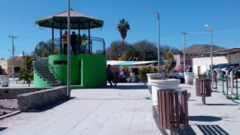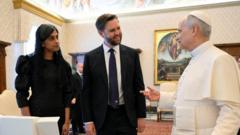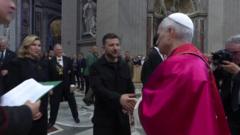As Pope Leo XIV, Cardinal Robert Prevost remains under scrutiny regarding his views on the role of women in the Catholic Church, following in Pope Francis' footsteps but setting distinct boundaries.
Pope Leo XIV's Stance on Women in Church Leadership: A Complex Legacy

Pope Leo XIV's Stance on Women in Church Leadership: A Complex Legacy
Newly appointed Pope Leo XIV navigates the balance between tradition and modernity in church leadership roles for women.
In 2023, Cardinal Robert Francis Prevost was part of a worldwide bishop meeting led by Pope Francis that sparked discussions on the potential for women to serve as deacons. Opposing this idea, he expressed concerns that "clericalizing women" might not resolve issues within the Church and could introduce new complications. His perspective reflects a hesitance to significantly alter established traditions that have been upheld for two millennia.
Now as Pope Leo XIV, the new pontiff is expected to confront inquiries regarding the role of women in the Church. Throughout his tenure as a Vatican administrator and Bishop in Latin America, he has demonstrated support for women’s involvement in various church capacities, although he has not endorsed deaconship for women.
In his previous role in the Vatican, Cardinal Prevost was responsible for evaluating, selecting, and supervising bishops and advocated for Pope Francis' initiative to enhance women’s leadership roles within the institution. He noted that the inclusion of women brought significant improvements to the office he managed.
Those acquainted with Prevost during his tenure as Bishop in Chiclayo, Peru, maintain that he fostered leadership opportunities for women in community organizations. Prior to his arrival, the diocese was predominantly guided by conservative bishops associated with Opus Dei. Local priest Rev. Pedro Vásquez remarked on Prevost's gradual but impactful changes benefitting women and girls.
Yolanda Díaz, a teacher from the Chiclayo diocese who participated in initiatives aiding migrants and trafficking survivors, acknowledged that under Prevost's leadership, the church progressively opened up opportunities for women. “Little by little the church has allowed us some involvement,” she stated, highlighting the emergence of women leading social pastoral efforts within the community.
Now as Pope Leo XIV, the new pontiff is expected to confront inquiries regarding the role of women in the Church. Throughout his tenure as a Vatican administrator and Bishop in Latin America, he has demonstrated support for women’s involvement in various church capacities, although he has not endorsed deaconship for women.
In his previous role in the Vatican, Cardinal Prevost was responsible for evaluating, selecting, and supervising bishops and advocated for Pope Francis' initiative to enhance women’s leadership roles within the institution. He noted that the inclusion of women brought significant improvements to the office he managed.
Those acquainted with Prevost during his tenure as Bishop in Chiclayo, Peru, maintain that he fostered leadership opportunities for women in community organizations. Prior to his arrival, the diocese was predominantly guided by conservative bishops associated with Opus Dei. Local priest Rev. Pedro Vásquez remarked on Prevost's gradual but impactful changes benefitting women and girls.
Yolanda Díaz, a teacher from the Chiclayo diocese who participated in initiatives aiding migrants and trafficking survivors, acknowledged that under Prevost's leadership, the church progressively opened up opportunities for women. “Little by little the church has allowed us some involvement,” she stated, highlighting the emergence of women leading social pastoral efforts within the community.



















